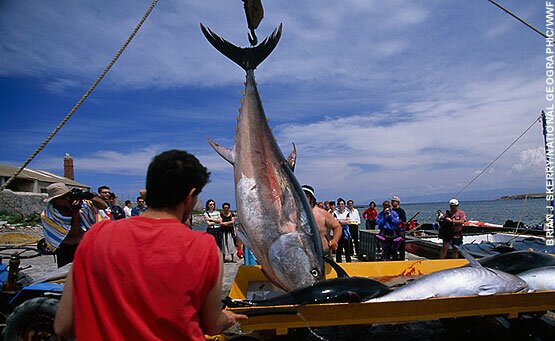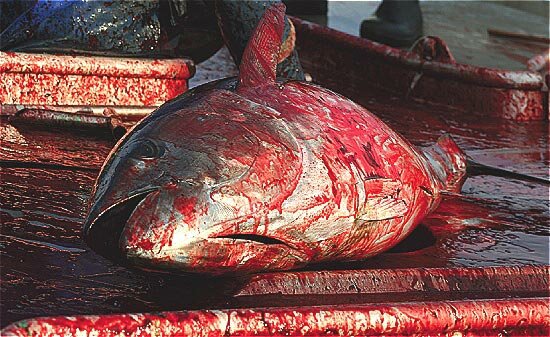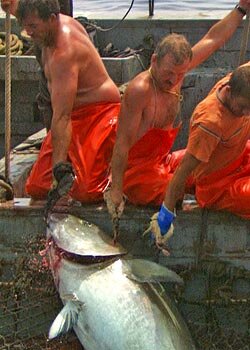Tag Archive for 'Mediterranean'
The Spanish version of The End of the Line, the first major feature documentary film revealing the impact of overfishing on our oceans, was launched by MarViva Foundation, Oceana Europe and renowned singer Miguel Bose in Madrid on 3rd February.

MarViva Founder and President, Erica Knie, speaks during the press conference presenting The End of the Line in Madrid, Spain. (From left to right), Knie, Oceana Europe Director Xavier Pastor, and artist Miguel Bose
The film examines the imminent extinction of bluefin tuna, brought on by increasing western demand for sushi; the impact on marine life resulting in huge overpopulation of jellyfish; and the profound implications of a future world with no fish.
Bose is the narrator in the Spanish version of the documentary, directed by Rupert Murray and based on investigative journalist Charles Clover’s book of the same name.
During the presentation, MarViva and Oceana released a statement signed by a group of environmental organisations and international figures urging Spain to support the ban on the international trade of bluefin tuna (Thunnus thynnus) at the next Conference of the Parties of the Convention on International Trade in Endangered Species of Wild Fauna and Flora (CITES) that will be held in Doha (Qatar) in March.
Representatives of Greenpeace, Ecologistas en Acción, Pew Foundation and the government of the Balearic Islands, and Roberto Mielgo (the former tuna farmer turned whistleblower who is a protagonist of the film) were present to support the statement.
They highlighted the critical situation that the species is undergoing in the North Atlantic and the need for immediate action to ensure its future. Decades of overfishing, illegal fishing and management dominated by industry interests, have decimated the bluefin tuna spawning stock to levels below 15 per cent of the existing population before industrial fishing.
Negotiations are currently taking place in the heart of the EU for a common stance for the CITES meeting, which will be a determining factor for this species’ future. The European Parliament’s Environment Committee, in a resolution within the process framework, has already urged Member States to support Monaco’s proposal for a ban on international trade.
The signatories consider that Spain has the responsibility of acting to preserve bluefin tuna, and they urge the Spanish government to immediately adopt and promote the following measures:
Support for the inclusion of bluefin tuna in Appendix I of CITES
Bluefin tuna is disappearing. The decades of management by the Contracting Parties to the International Commission for the Conservation of Atlantic Tunas (ICCAT), which include the EU, have been called an “international disgrace” [Report of the Independent Performance Review of ICCAT, 2008].
The parties have shown themselves to be incapable of adopting the necessary measures such as quotas in accordance with scientists’ advice or the closure of the fishery during the spawning period. CITES is currently the sole valid alternative to guarantee the future of this species.
On the other hand, the socio-economic considerations do not make sense in this context. The EU Member States must guarantee the fishing industry’s long-term viability. The administration’s current position only constitutes a guarantee that bluefin tuna fishing will cease to exist in the near future.
Spain, which currently holds the EU presidency and has the highest quota percentage among Member States, therefore has the responsibility of supporting this measure.
Creation of marine reserves in bluefin tuna spawning areas
The protection of bluefin tuna spawning areas in the Mediterranean through the creation of marine reserves is a necessary step to protect this species, starting with the area located to the south of the Balearic Islands where there is already sufficient scientific information that upholds the immediate need for protection.
The signatories include:
Organisations:
1. Palma Aquarium
2. PEW Foundation
3. Slow Food Spain
4. Slow Food Illes Balears
5. Greenpeace España
6. Avina
7. Ecologistas en Acción
8. WWF
9. Grup Balear de Ornitología (GOB) Mallorca
10. Grup Balear de Ornitología (GOB) Menorca
11. Grup Balear de Ornitología (GOB) Eivissa
12. Instituto Internacional de Derecho y Medio Ambiente (IIDMA)
13. Amics de la Terra Balears
14. Amigos de la Tierra Spain
15. Centro de Estudios Rurales y de Agricultura Internacional (CERAI)
International Public figures:
1. Kofi Annan, former secretary general, United Nations
2. Javier Solana, former High Representative of the European Union for the Common
Foreign and Security Policy
3. Michael Douglas, actor
4. José María Figueres, former President of Costa Rica
5. Sybilla, designer
6. Ted Danson, actor
7. Elle MacPherson, model
8. Basilio Baltasar, Director, Fundación Santillana
9. Dr. Enric Sala, investigative scientist of Consejo Superior de Investigaciones Científicas (CSIC) y Ocean Fellow, National Geographic Society
10. Diego Hidalgo, President, Fundación para las Relaciones Internacionales y el Diálogo Exterior (FRIDE)
11. Jordi Bigas, journalist
12. Diego Azqueta, Honorary President, WATU Acción Indígena
13. Sean Cleary, CEO, Strategic Concepts
14. Colin and Livia Firth, actors
15. Jordi Bigas, environmental journalist
16. Víctor Viñuales, Director, Ecología y Desarrollo
17. Pedro Barbadillo, director
18. Rupert Murray, director, The End of the Line
19. George Duffield, producer, The End of the Line
20. Charles Clover, investigative journalist, author of The End of the Line
21. Valeria Golino, actress
22. Baron Eric De Rothschild, banker
23. Greta Scacchi, actress
24. Stephen Fry, actor
25. Dr. Carles Amengual i Vicens, Education Secretary, Liga Médico Homeopática Internacional
26. Yannick y Ben Jakober, artists
27. Irene Peukes, designer
28. Sandy Hemingway, President, Amigos de la Tierra Spain
29. Liliane Spendeler, Director, Áreas Ambientales, Amigos de la Tierra Spain
30. Yolanda Kakabadse, former President, IUCN, and Senior Advisor, Fundación Futuro Latinoamericano
31. Prof. Jacques Marcovitch, former President, Universidad de Sao Paulo
32. Jaume Tapies, chef and President, Relais & Chateaux
33. Musaed Al Saleh, Council member, Earth Council Geneva (ECG)
34. Jacques Perrin, director and producer
35. Tom Aikens, chef
36. Sophie Andrieu, author
37. Joanna Lumley, actress
38. Charles Dance, actor
39. Fiona Shaw, actress
40. Zac Goldsmith, environmental journalist
41. Damian Aspinall, entrepreneur
42. Ben Elliot, entrepreneur
43. Ben and Kate Goldsmith, entrepreneur and envionromentalists
44. Laura Bailey, actress
45. Alan Rickman, actor and director
46. Prince Urbano Barberini, actor
47. Richard E Grant, actor
48. Sophie Dahl, writer and model
49. Emilia Fox, actress
50. Amber Valletta, actress and model

Bluefin tuna - sometimes you just can’t believe how absurd the story gets.

Raul Romeva i Rueda and Charles Clover at ICCAT
News from WWF and a Green MEP show that over an eight-year period the EU bluefin tuna fishing industry received subsidies totalling €34.5m.
Yes folks, your tax helped fund the overfishing of a species now teetering on the very brink of extinction. A species that 21 out of 27 EU countries now think should be subject to an international trade ban.
Raül Romeva i Rueda, a Spanish Green MEP, received answers to parliamentary questions revealing the extent of subsidies which took place between 2000 and 2008.
Of the €34.5m total, some €33.5m was for the construction and modernisation of fishing vessels, and only a tiny proportion (€1m) for decommissioning boats.
These revelations come as the EU Commission and member states have to start readdressing their own thoughts on Atlantic bluefin. Last month’s ICCAT meeting in Brazil failed to close the fishery, and saw EU negotiators (led by France and Spain) pushing for the highest possible quotas.
This in itself was hypocrisy after three-quarters of EU member states had voted to support an international ban on the species - showing just how disproportionately powerful the lobby of the Mediterranean fishing nations is.
These new revelations make the whole EU bluefin story even more difficult to swallow, since the already lucrative trade in bluefin (which has escalated despite scientific warnings) has been made even more profitable with taxpayers’ money. And it’s not even as if the subsidies were targeted at supporting traditional or lower-impact methods of fishing - they also applied to the massive purse-seiners.
The beneficiaries of the money were Cyprus, France, Greece, Italy, Malta and Spain. In an amazing coincidence the six EU member states which blocked support for an international trade ban were Cyprus, France, Greece, Italy, Malta and Spain.
It really makes you wonder what the 21 other EU countries are getting out of this arrangement… and what exactly they will do next? The EU must come up with an agreed common position before the CITES meeting in March 2010.
Many countries like the UK have already publicly supported a full trade ban. This new illustration of just
how the countries blocking effective measures to protect this species are being subsidised to trash the species can surely only strengthen the case for such a ban.

The European Commission has given its backing for a suspension of international trade in the endangered Atlantic and Mediterranean bluefin tuna – following a celebrity letter calling on President Barroso to save the species from extinction.
The European Commission – led by Stavros Dimas, Commissioner for the Environment and Joe Borg, Commissioner for Fisheries and Maritime Affairs – agreed to propose to ministers that the EU backs Monaco’s proposal to list the bluefin on on Appendix I of the Convention on International Trade in Endangered Species of Wild Fauna and Flora (CITES).
The ban, which is hotly opposed by Japan and was also by Mr Borg’s officials, would ban all international trade of Atlantic bluefin tuna, and give the endangered species a chance of recovery. The Commissioners said this ban would be “temporary.”
EU countries will decide whether to confirm backing for the proposal on Sept 21. The EU will vote as usual as a bloc of 27 countries at the CITES meeting in Doha, Qatar in March next year.
Conservationists have warned that the bluefin’s spawning population would be wiped out by 2012 in the Mediterraneal and Eastern Atlantic without a ban on international trade for stocks to recover.
A petition by supporters of The End of the Line’s campaign to reform European fisheries was sent to President Barroso this week.
The original signatories, including the actors Greta Scacchi, Stephen Fry and Colin Firth, have been joined, among others, by Joanna Lumley, the French food writer Sophie Andrieu, the vineyard owner Baron Eric De Rothschild, the Italian actress Valeria Golino and the American narrator of The End of the Line, Ted Danson.

President Sarkozy of France has announced his country’s support for a ban on international trade in endangered bluefin tuna before it disappears forever from the sea and our plates.
His initiative was followed quickly by a similar announcement by Huw Irranca-Davies, the British fisheries minister.
The backing of two major EU countries for a ban on the international bluefin tuna trade has instantly given weight and momentum to the campaign by Monaco - and our film, The End of the Line - to have the bluefin listed under the Convention on International Trade in Endangered Species of Wild Fauna and Flora (CITES) next year.

Fishermen haul in a catch of Northern bluefin tuna (Thunnus thynnus) caught with the traditional 'Mattanza' fishing method, Mediterranean Sea
The United States will now be under pressure to respond. Speaking at the close of a national stakeholder consultation on France’s future sustainable fisheries and maritime policy, President Sarkozy said: “France supports listing bluefin tuna on the CITES convention to ban international trade.”
He added: “Ours is the last generation with the ability to take action before it’s too late – we must protect marine resources now, in order to fish better in future. We owe this to fishermen, and we owe it to future generations.” Continue reading ‘Sarkozy takes the lead on saving the bluefin tuna’

The breeding population of bluefin tuna in the Eastern Atlantic and the Mediterranean has collapsed, in what may come to be seen as one of the world’s most spectacular ecological disasters, according to an independent report.
- The 2008 bluefin tuna dossier - Advanced Tuna Ranching Technologies [pdf of the full report by Roberto Mielgo]
The destruction of stocks of one of the world’s most expensive fish, already recognised as being as endangered as the giant panda, effectively took place in 2007, more than twice the legal catch was taken by Mediterranean fishermen under the eyes of EU and UN-recognised officials, according to the report.

Bluefin tuna image from The 2008 bluefin tuna dossier by Advanced Tuna Ranching Technologies
If the analysis of the size and weight of tuna now passing through the Japanese market is representative of what remains in the sea, according to the report, the EU and other Atlantic nations have presided over disaster comparable to that of the collapse of the blue whale or the Northern cod.
Environmentalists blame the final destruction of what was the largest population of a fish which is known to have been hunted for 7,000 years on a catastrophic failure of governance by the EU and the International Commission for the Conservation of Atlantic Tunas (ICCAT).
Rampant illegal fishing with spotter aircraft, fast power-boats and the full modern hi-tech arsenal of fishing technology has hastened the decline.
A-list diners, including Charlize Theron, Sting and Elle Macpherson signed a letter of protest last week to Nobu Matsuhisa, the world-famous fushion chef, threatening to boycott his restaurants unless he takes the endangered bluefin tuna off the menu.
According to the latest report, released to coincide with World Oceans Day by the independent consultant Roberto Mielgo, 70 per cent of the bluefin tuna in the Japanese market between July 1 last year and May 1 this year were below 90 kilos in weight.
Some 33 per cent of the tunas on the Japanese market were below the legal size of 30 kg when caught – a major indictment of the inspection regime run by Mediterranean countries under the supervision of ICCAT.
Mr Mielgo said: “If this analysis of what is on the Japanese auction markets corresponds to what is left in the sea, we are in deep trouble. It means the adult bluefins are no longer there. If that is what is at sea, the stock will not recoup.
“My view is that the stock collapsed in 2007 as a result of the 2007 fishing season in which 61,000 tons of bluefin were caught. The fishery should have been closed in 2007.”
The 61,000 tons recorded in official catch figures in 2007 was twice the legal quota agreed by EU nations and ICCAT, four times what scientists advised was responsible and six times what ICCAT’s own scientists said was needed for the recovery of the stock.
Ten years ago, the majority of bluefin tuna in the Japanese market were medium-sized mature adults of 120 kgs or more and the stock structure wholly different to what it is now. Now a third of it is below the minimum landing size and causing concern even among Japanese tuna traders who dislike selling small fish.
Mr Mielgo’s report concludes: “The massive presence in the Japanese market of juvenile bluefin tunas having been illegally caught and farmed points to the failure of current control schemes, including the credibility of observers filling in caging declarations.”
Mr Mielgo is a tuna farmer turned whistle-blower. The report by his consultancy, Advanced Tuna Ranching Technologies, goes even further than trends presented earlier this year by WWF using official figures which showed that the population of breeding tuna in 2007 was only a quarter of that 50 years ago.
According to WWF’s analysis, the bluefin breeding population will disappear by 2012 under the current fishing regime. It called for the immediate closure of the fishery.
Mr Mielgo’s report says the age-profile of tunas on the Japanese market “is consistent with the hypothesis of an on-going collapse of the breeding population of this stock.”
He added: “It’s not that I am a pessimist. There is no way this population is going to pick up. Again, I hope I am wrong. The fish are not there.”
Dr Sergi Tudela, head of fisheries for the Mediterranean, said: “Our position in April, based on ICCAT data, is that the spawning stock will have been wiped out by 2012.
“This new data is a further indication of what we said then, which is that the spawners are disappearing. The reproducing stock is in serious trouble. This shows the bluefin is in dire straits.”
Mr Mielgo is featured in the film, The End of the Line, which has its national public premiere in 50 British cinemas tomorrow.

No, this is not another story about the crazy things we feed to our farm animals, but rather yet another sad tale of failure in fisheries management … and yet another nail in the coffin for bluefin tuna in the Mediterranean.
Quite apart from the fact that ICCAT (the body responsible for managing fish like bluefin tuna) has been repeatedly denounced as not fit for the job (specifically it was called an ‘international disgrace’ last year); and aside from the politicians having yet again set quotas for bluefin tuna in excess of the scientists recommendations; skipping over the issue of rampant illegal fishing for this species; and parking the small issue of this being an endangered species… Turkey has just unilaterally set itself a quota for bluefin, breaking international commitments and sticking two fingers up at any coordinated attempt to manage the species across national boundaries.
This is on top of a Greenpeace investigation revealing that between 5 and 10 tonnes of juvenile bluefin tuna had been landed in a Turkish port.
Now, as we know, fish (and other animals) don’t respect national boundaries, so in theory some international cooperation is a good idea when it comes to looking after these animals. Right? You’d think. But in true tragedy-of-the-commons style, that is often scant comfort for things that live in the ocean. Fish are horse-traded against other political issues, and compliance and enforcement is, well, variable to say the least.
But think for a moment, to what might happen if bluefin tuna were not a fish, but a land animal, like the similarly endangered rhino, tiger, or gorilla … would this be allowed to happen?
Maybe bluefin are just not cuddly enough, and a little too tasty – but they are amazing animals. This is one of the reasons why bluefin are the tragic stars of the new movie, The End Of The Line. If they were mammals they might be admired for their size (like elephants), speed (like cheetahs) or their place as a top predator (like tigers).
Sadly – they are more likely to be appraised only for the amount of dollars or yen they fetch at market. Of course this is scandalously short-sighted, and our collective greed and disregard is pushing the species towards extinction.
The people in charge of ‘managing’ bluefin tuna have failed – it’s time for a new approach, and for the species to be treated as it would be if it were an endangered animal on land. And with politicians and fishermen unwilling to do the right thing, it’s time for consumers and suppliers to take a stance.
So it’s up to the big players like Nobu, who serve up bluefin as sushi to celebrity diners, and Mitsubishi, who are the biggest traders in bluefin in the Mediterranean.
Not only should we all be avoiding bluefin on our menus, but also demanding our politicians take action to turn things around, and hopefully rescue the species from the abyss. The first step in the Mediterranean would be a ban on fishing all bluefin until such time as the management and enforcement was sorted out, and in setting aside areas where we know bluefin breed as protected Marine Reserves.
Otherwise, it might well be the end of the line for an iconic ocean species.

With concern over bluefin tuna stocks growing among environmental groups, we round up the latest news at the start of the Mediterranean bluefin tuna fishing season.

A large tuna is caught by fishermen
Reuters report that a new WWF report says overfishing is set to wipe out bluefin tuna in three years.
The news agency says: “Overfishing will wipe out the breeding population of Atlantic bluefin tuna, one of the ocean’s largest and fastest predators, in three years unless catches are dramatically reduced, conservation group WWF said.
“As European fishing fleets prepare to begin the two-month Mediterranean fishing season, WWF said its analysis showed the bluefin tuna that spawn - those aged four years and older - will have disappeared by 2012 at current rates.”
Sergi Tudela, head of fisheries at WWF Mediterranean, said: “For years people have been asking when the collapse of this fishery will happen, and now we have the answer.” Continue reading ‘Bluefin tuna fishing season starts in the Mediterranean’


![]()






